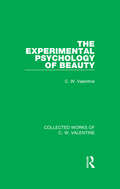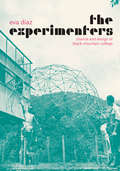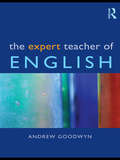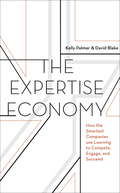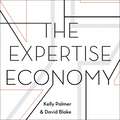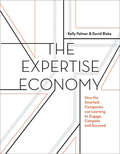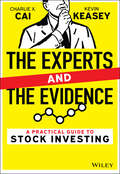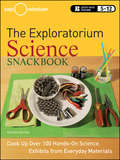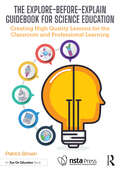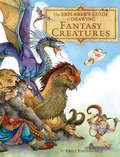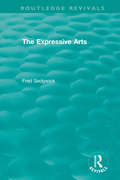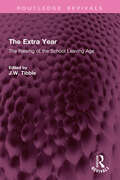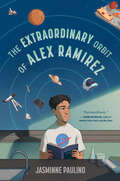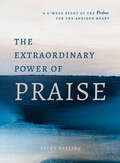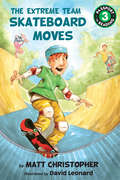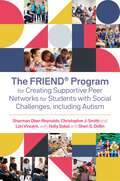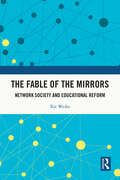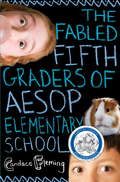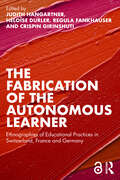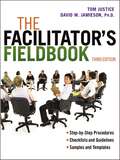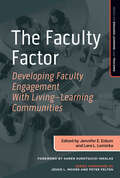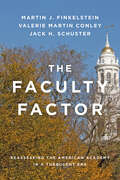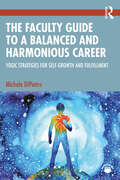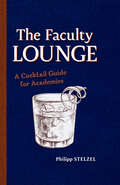- Table View
- List View
The Experimental Psychology of Beauty: The Experimental Psychology Of Beauty (Collected Works of C.W. Valentine)
by C.W. ValentineOriginally published in 1962, the experimental study of aesthetics was a field particularly associated with the name of C.W. Valentine, who in this book provided a critical review of research carried out since the end of the nineteenth century principally by British and American psychologists. The investigations described, many of them conducted by the author, are concerned with individual responses to what is commonly regarded as beautiful in painting, music, and poetry, an important distinction being made between the perception of objects as ‘beautiful’ as opposed to ‘pleasing’. The reactions of children and adults, and of people having different ethnic and social backgrounds, are explored in a variety of experiments dealing with specific elements, including colour, form, and balance in painting; musical intervals, discord, harmony, melody, and tempo; and rhythm, metre, imagery, and associations in classical and romantic poetry. Other experiments seek to disclose the temperamental and attitudinal factors underlying individual differences in the judgement and appreciation of specific works of art. Of particular interest are the studies of responses to modern paintings, poems and musical compositions. The findings throw light on the development of discrimination and taste and suggest the possibility of some common factor in the appreciation of these three arts. It was felt that critics as well as psychologists and aestheticians would find much to encourage reflection and to stimulate further research.
The Experimenters: Chance and Design at Black Mountain College
by Eva DíazIn the years immediately following World War II, Black Mountain College, an unaccredited school in rural Appalachia, became a vital hub of cultural innovation. Practically every major artistic figure of the mid-twentieth century spent some time there: Merce Cunningham, Ray Johnson, Franz Kline, Willem and Elaine de Kooning, Robert Motherwell, Robert Rauschenberg, Dorothea Rockburne, Aaron Siskind, Cy Twombly--the list goes on and on. Yet scholars have tended to view these artists’ time at the College as little more than prologue, a step on their way to greatness. With The Experimenters, Eva Díaz reveals the importance of Black Mountain College--and especially of three key teachers, Josef Albers, John Cage, and R. Buckminster Fuller--to be much greater than that. Díaz’s focus is on experimentation. Albers, Cage, and Fuller, she shows, taught new models of art making that favored testing procedures rather than personal expression. These methodologies represented incipient directions for postwar art practice, elements of which would be sampled, and often wholly adopted, by Black Mountain students and subsequent practitioners. The resulting works, which interrelate art and life in a way that imbues these projects with crucial relevance, not only reconfigured the relationships among chance, order, and design--they helped redefine what artistic practice was, and could be, for future generations. Offering a bold, compelling new angle on some of the most widely studied creative figures of modern times, The Experimenters does nothing less than rewrite the story of art in the mid-twentieth century.
The Expert Teacher of English
by Andrew GoodwynThe Expert Teacher of English is for all passionate teachers – both novice and expert - who aspire to become outstanding professionals. It considers what we mean by ‘expert’ and ‘expertise’, explores concepts that are vital to understanding what expertise in teaching is ‘for’, and discusses the characteristics of excellent teaching. As increasing attention is being paid to the concept of the professional who can model excellent teaching and mentor and develop others, it provides a critical analysis of The Advanced Skills Teacher and the Excellent Teacher, as well as the Chartered Teacher in Scotland and the ‘highly accomplished teacher’ in the US. Ideas and issues considered include: The nature of English as a school subject What it means to be part of a profession Curriculum design, lesson planning and assessment Opportunities for technologies in the English classroom Working collaboratively with colleagues, mentoring and observation Continuing professional development and research Drawing on the views, ideas and experiences of a group of skilful teachers, The Expert Teacher of English aims to stimulate personal and professional development, help you reflect on the concept of expertise, and support you as you develop as a highly accomplished teacher.
The Expertise Economy: How the Smartest Companies Use Learning to Engage, Compete and Succeed
by Kelly Palmer David BlakeThe world of work is going through a large-scale transition with digitization, automation and acceleration. Critical skills and expertise are imperative for companies and their employees to succeed in the future, and the most forward-thinking companies are being proactive in adapting to the shift in the workforce. Kelly Palmer, Silicon Valley thought-leader from LinkedIn, Degreed, and Yahoo, and David Blake, co-founder of Ed-tech pioneer Degreed, share their experiences and describe how some of the smartest companies in the world are making learning and expertise a major competitive advantage.The authors provide the latest scientific research on how people really learn and concrete examples from companies in both Silicon Valley and worldwide who are driving the conversation about how to create experts and align learning innovation with business strategy. It includes interviews with people from top companies like Google, LinkedIn, Airbnb, Unilever, NASA, and MasterCard; thought leaders in learning and education like Sal Khan and Todd Rose; as well as Thinkers50 list-makers Clayton Christensen, Daniel Pink and Whitney Johnson. The Expertise Economy dares you to let go of outdated and traditional ways of closing the skills gap, and challenges CEOs and business leaders to embrace the urgency of re-skilling and upskilling the workforce.
The Expertise Economy: How the Smartest Companies Use Learning to Engage, Compete and Succeed
by Kelly Palmer David BlakeDrawing on the science of how we learn, The Expertise Economy shows companies big and small how to transform their employees into experts and ultimately their biggest competitive advantage.The world of work is going through a large-scale transition with digitization, automation and acceleration. Critical skills and expertise are imperative for companies and their employees to succeed in the future, and the most forward-thinking companies are being proactive in adapting to the shift in the workforce. Kelly Palmer, Silicon Valley thought-leader from LinkedIn, Degreed, and Yahoo, and David Blake, co-founder of Ed-tech pioneer Degreed, share their experiences and describe how some of the smartest companies in the world are making learning and expertise a major competitive advantage.The authors provide the latest scientific research on how people really learn and concrete examples from companies in both Silicon Valley and worldwide who are driving the conversation about how to create experts and align learning innovation with business strategy. It includes interviews with people from top companies like Google, LinkedIn, Airbnb, Unilever, NASA, and MasterCard; thought leaders in learning and education like Sal Khan and Todd Rose; as well as Thinkers50 list-makers Clayton Christensen, Daniel Pink and Whitney Johnson. The Expertise Economy dares you to let go of outdated and traditional ways of closing the skills gap, and challenges CEOs and business leaders to embrace the urgency of re-skilling and upskilling the workforce.(P)2018 Hodder & Stoughton Limited
The Expertise Economy: How the smartest companies use learning to engage, compete, and succeed
by Kelly Palmer David BlakeThe workplace is going through a large-scale transition with digitization, automation, and acceleration. Critical skills and expertise are imperative for companies and their employees to succeed in the future, and the most forward-thinking companies are being proactive in adapting to the shift in the workforce. Kelly Palmer, Silicon Valley thought-leader from LinkedIn, Degreed, and Yahoo, and David Blake, co-founder of Ed-tech pioneer Degreed, share their experiences and describe how some of the smartest companies in the world are making learning and expertise a major competitive advantage.The authors provide the latest scientific research on how people really learn and concrete examples from companies in both Silicon Valley and worldwide who are driving the conversation about how to create experts and align learning innovation with business strategy. It includes interviews with people from top companies like Google, LinkedIn, Airbnb, Unilever, NASA, and MasterCard; thought leaders in learning and education like Sal Khan and Todd Rose; as well as Thinkers50 list-makers Clayton Christensen, Daniel Pink, and Whitney Johnson. The Expertise Economy dares you to let go of outdated and traditional ways of closing the skills gap, and challenges CEOs and business leaders to embrace the urgency of re-skilling and upskilling the workforce.
The Experts and the Evidence: A Practical Guide to Stock Investing
by Kevin Keasey Charlie X. CaiTHE EXPERTS AND THE EVIDENCE A PRACTICAL GUIDE TO STOCK INVESTING Explore and apply celebrated investing strategies with practical tools from an expert team of finance professors In The Experts and the Evidence: A Practical Guide to Stock Investing, a veteran team of finance researchers and practitioners delivers a one-of-a-kind explanation of how to use data and analytics tools to test and implement the philosophies and strategies of well-known investing experts. Combining a comprehensive discussion of the investment philosophies of renowned investors with rigorous testing and implementation, the authors provide a hands-on tool for starting and maintaining a diversified portfolio. Readers will also find: Quantitative explorations of popular investing strategies. Useful tools for systematically exploring different investment approaches. Discussions of value, growth, contrarian, portfolio, and factor investing, as well as technical analysis and advanced quantitative investing. An ideal resource for readers familiar with the basics of the financial markets and looking for a guide to a range of proven investment approaches, The Experts and the Evidence is also an essential read for advanced undergraduate and graduate students seeking a real-life informational and analytical system for the application of investment strategies.
The Exploratorium Science Snackbook
by Exploratorium Teacher InstituteKids and teachers can build their own science projects based on exhibits from San Francisco's premiere science museumThis revised and updated edition offers instructions for building junior versions, or "snacks," of the famed Exploratorium's exhibits. The snacks, designed by science teachers, can be used as demonstrations, labs, or as student science projects and all 100 projects are easy to build from common materials. The Exploratorium, a renowned hands-on science museum founded by physicist and educator Frank Oppenheimer, is noted for its interactive exhibits that richly illustrate scientific concepts and stimulate learning.Offers a step-by-step guide for building dynamic science projects and exhibitsIncludes tips for creating projects made from easy-to-assembly itemsThoroughly revised and updated, including new "snacks," images, and references
The Explore-Before-Explain Guidebook for Science Education: Creating High Quality Lessons for the Classroom and Professional Learning
by Patrick BrownThis guidebook uses an Explore-before-Explain instructional sequence to help you facilitate the design of active meaning-making lessons in science.Author Pat Brown models and breaks down how an Explore-before-Explain approach ensures students' conceptual understandings are constructed primarily on evidence-based experiences in the classroom. From prompting students to ponder patterns, helping them identify cause-and-effect relationships, to focusing on development of their thinking rather than validating ideas, you can use Explore-before-Explain instruction to help your students feel confident in their thinking and become more self-directed learners. Chapters focus on developing your students' conceptual science understanding through the investigation of natural occurrences. Content and module examples are provided, as well as attention to contemporary standards and safety in science. Rather than acting as a prescriptive program, however, this book adds another element to your curriculum design, showing how lessons can and should include critical elements of active sensemaking when designing an Explore-before-Explain sequence. In addition, the author shows the benefits of bringing Explore-before-Explain outside the classroom to create high-quality professional and curriculum-based learning.This resource is ideal for K-12 science teachers, as well as building administrators who are looking for a practice-oriented and research-based approach for their science curriculum. As a classroom educator, you can use these strategies for leveraging research into hands-on, minds-on activities to promote more robust and equitable learning environments. For leaders, this resource can be used to develop professional learning experiences for sustained departmental improvement.
The Explorer's Guide to Drawing Fantasy Creatures
by Emily FiegenschuhIf you're looking for an escape from ordinary life, the adventure starts here. The Explorer's Guide to Drawing Fantasy Creatures brings to light a fantastic realm of creatures so elusive and remote, they can be found only in myths, nightmares, and the work of artists like you. With years of perilous creature-drawing adventures behind her, Emily Fiegenschuh leads you step by step through the entire process, from expressive gesture drawings to beautifully detailed artwork, right down to all the gruesome details--like how to draw the leathery wings of dragons, the Minotaur's impressive physique, and the brilliant plumage of the Hook-Legged Bodeo. 25 step-by-step demonstrations for creating a bevy of beasts that roam air, land and sea Important basics of drawing, proportion and perspective to help you bring believability to your creatures Instruction for adding living, breathing color to finished sketches Expert tips on finding inspiration, developing personalities, designing costumes, and more. Grab your sketchbook, and venture forth, if you dare. Bring to life the creatures within these pages, as well as those lurking in the shadows of your own imagination.
The Expressive Arts (Routledge Revivals)
by Fred SedgwickOriginally published in 1993, this book addresses the issue of the place of the expressive arts in primary schools in the years around and beyond the implementation of the National Curriculum. It comprises a set of case studies on the language arts, painting and drawing, dance, drama and music, that suggest ways forward in teaching these arts to children aged between four and eleven.
The Extra Year: The Raising of the School Leaving Age (Routledge Revivals)
by J. W. TibbleFirst Published in 1970, The Extra Year discusses the raising of the school leaving age, a crucial event in British education. It is also highly controversial: its repercussions affected teachers, educationists, parents and employers as well as pupils themselves. Each of the contributors to this book examines one aspect of its implications. After a general introduction by Professor Tibble, Malcolm Seaborn looks at the historical background of the decision to raise the school leaving age and Professor Eggleston considers some of its sociological aspects. Professor Tibble then examines the ways in which the situation will affect pupils and their teachers, John Sheehan discusses some economic factors and Tyrrell Burgess looks at the implications for further education. The headmaster’s point of view is given by Albert Rowe and probable changes in the school curriculum are analyzed by Dennis Lawton. A final chapter by Professor McAulay discusses American experience. This is an important historical reference work for students and scholars of education.
The Extraordinary Orbit of Alex Ramirez
by Jasminne PaulinoA powerful debut novel in verse about a neurodivergent seventh grader who dreams of traveling to the stars one day.&“This story is about a boy who is certain of his own magic in the midst of the doubtful adults around him. A kid who knows not even the sky, but the stars are the limit. Which makes Paulino's debut...extraordinary.&” —Jason Reynolds, author of National Book Award finalist Look Both Ways and Newbery Honor Book Long Way DownSeventh grader Alex's favorite things to do are watching YouTube videos of rocket launches with his Papi and spending hours on the NASA website reading about astronauts and planets. He even dreams of going to space one day himself, and knows he'll have to study hard in order to get there.But Alex is in his grade's SC (self-contained) classroom, which means doing the same dull worksheets every day and reading books his sister read back in the third grade. Worst of all, being in SC means nobody thinks he's ready to join Ms. Rosef's mainstream science class—the class Alex knows will be the first step on his path to NASA.When his teacher says "not yet" for the millionth time, Alex decides it's time to make a change. Now he's ready to try everything he can to get the people in his life—his teachers, his parents, and the kids at school—to understand that he, Alex Ramirez, is capable of the extraordinary.
The Extraordinary Power of Praise: A 6-Week Study of the Psalms for the Anxious Heart
by Becky HarlingWhen stress abounds, soothe your anxious heart with peace and praise.From constant waves of negative news to meeting family, career, and community needs, women today often feel more anxious than ever. Amidst the clamor of the world and the internal longings for peace, our overwhelming need is for more of God&’s extraordinary presence, peace, and power in our lives.Join Becky Harling for a 6-week study that looks to Psalm 94:19: &“When anxiety was great within me, your consolation brought me joy!&” The Extraordinary Power of Praise will help you put into practice the two-step process for soothing an anxious heart: finding joy to replace anxiety and learning to pour out our hearts to God in praise. Each day includes a study of a Psalm, thought provoking questions, and short morning and evening prayers. You&’ll also find suggested praise songs and prayer journaling prompts to help you engage more deeply with God. As you meditate on the Psalms throughout this 6-week study, you&’ll experience the genuine joy of God&’s presence, develop a positive outlook in the midst of the world&’s stress, and find victory over fear and anxiety.The Extraordinary Power of Praise is suited for both individual and group use. For more of Becky&’s engaging, empathetic Bible teaching, go deeper into this study with the companion video series, available on Vimeo or for download. You can also find more peace through the Psalms with Becky&’s latest daily devotional Psalms for the Anxious Heart.
The Extraordinary Power of Praise: A 6-Week Study of the Psalms for the Anxious Heart
by Becky HarlingWhen stress abounds, soothe your anxious heart with peace and praise.From constant waves of negative news to meeting family, career, and community needs, women today often feel more anxious than ever. Amidst the clamor of the world and the internal longings for peace, our overwhelming need is for more of God&’s extraordinary presence, peace, and power in our lives.Join Becky Harling for a 6-week study that looks to Psalm 94:19: &“When anxiety was great within me, your consolation brought me joy!&” The Extraordinary Power of Praise will help you put into practice the two-step process for soothing an anxious heart: finding joy to replace anxiety and learning to pour out our hearts to God in praise. Each day includes a study of a Psalm, thought provoking questions, and short morning and evening prayers. You&’ll also find suggested praise songs and prayer journaling prompts to help you engage more deeply with God. As you meditate on the Psalms throughout this 6-week study, you&’ll experience the genuine joy of God&’s presence, develop a positive outlook in the midst of the world&’s stress, and find victory over fear and anxiety.The Extraordinary Power of Praise is suited for both individual and group use. For more of Becky&’s engaging, empathetic Bible teaching, go deeper into this study with the companion video series, available on Vimeo or for download. You can also find more peace through the Psalms with Becky&’s latest daily devotional Psalms for the Anxious Heart.
The Extreme Team: Skateboard Moves
by Matt Christopher David LeonardCharlie Abbott is the new kid in town--again. He hates everything about moving, especially trying to make new friends. Then he meets a kid called X who shares his love of skateboarding. Together, they rip some moves at the town skatepark. But then Charlie's skateboard vanishes from his garage, and he sees X riding around on a skateboard that looks just like his! Is Charlie's new life about to become a disaster?Passport to Reading Level 3
The FRIEND® Program for Creating Supportive Peer Networks for Students with Social Challenges, including Autism
by Christopher J. Smith Holly Sokol Sheri S. Dollin Sharman Ober-Reynolds Lori VincentFRIEND is a social, communication and play-based program to help school-aged children with social challenges. All students deserve a positive school experience where they can reach their social and academic potential. However, this can prove difficult for students with challenges such as attention deficit, anxiety, or autism spectrum disorders, who may struggle daily with social situations. This manual provides everything educators need to support these students with their social skills in everyday situations, throughout their school years. This program is designed to help any student with social challenges, no matter how subtle. For students without social challenges, it teaches tolerance, acceptance and understanding. The characteristics of successful social skills programs are described, with an emphasis on how FRIEND implements them through three key components: the Peer Sensitivity Curriculum, the FRIEND Lunch Program and the FRIEND Playground Program. These can be implemented individually or in any combination as a comprehensive program. Parents and family are offered information on working together with schools and implementing FRIEND strategies at home and in the community. Emphasizing peer sensitivity, education and a supportive environment, FRIEND is for any educator wanting to create an inclusive and safe atmosphere for students to learn social skill-building strategies.
The Fable of the Mirrors: Network Society and Educational Reform
by Xie WeiheThis book examines the impact of network society on self-identity and education and proposes key tasks for transforming education in network society.Using the metaphor of the "mirror", the book describes the environment and changes in network society based on the internet and information technology. As the diversity and complexity of network society increases, people see more and more self-images in the large mirrors, leading to a variety of developmental orientations and self-identities, as well as more opportunities for objectification. However, this often leads to confusion as to which image in the mirror really represents oneself. This social framework, which forms the backdrop of modern education, poses new challenges for self-identity formation and educational development. The author emphasizes the role of education in constructing a new "mirror" that can lead children and young people to a better perception of themselves, and thus to self-identification and self-realization.The title will be of interest to scholars and students in the fields of educational theory and sociology of education, as well as general readers interested in topics related to network society, identity, and education.
The Fabled Fifth Graders of Aesop Elementary School
by Candace FlemingHere's a chapter book with all the kid appeal and absurd mayhem of Louis Sachar's classic Sideways Stories from Wayside School! These hilarious fables, complete with morals, will make you wishyouwent to Aesop Elementary. Welcome back to Mr. Jupiter's inimitable class at Aesop Elementary. His rambunctious,specialstudents are fifth graders now . . . and they rule the school! Bernadette Braggadoccio stirs things up when her probing investigative reporting for the school's TV station reveals some scan...
The Fabrication of the Autonomous Learner: Ethnographies of Educational Practices in Switzerland, France and Germany
by Judith Hangartner Héloïse Durler Regula Fankhauser Crispin GirinshutiThis book provides a thorough and detailed analysis of how the figure of the ‘autonomous learner’ shapes educational practices. It unpacks the impact of current educational reform discourse that focuses on the individual pupil as a learner, while neglecting the social dimensions of classroom practices. In view of the yet unknown requirements of the knowledge economy, students are demanded to take more responsibility for their learning and to become self-reliant, independent, lifelong learners. In turn, teachers are asked to tailor education to the individual needs of their students and to foster their individual learning trajectories. Based on in-depth fieldwork and long-term observation of interactions in classrooms and other scholastic settings, scholars from three European countries – France, Germany and Switzerland – show how the translation of the figure of the ‘autonomous learner’ into classrooms is shaped by distinct cultural traditions. Chapters analyse teaching routines and conceptions of self-reliance involved in autonomy-oriented settings and discuss how these change the sociality of the classroom. They scrutinize how autonomy is used to differentiate between students and how it contributes to the reproduction of social inequality. The book brings into dialogue two neighbouring research traditions that research autonomous learning from a sociological perspective and which have largely ignored each other until now. In so doing, the contributions engage a critical perspective for a careful empirical analysis in order to better understand what is being done in the name of autonomy. Providing insight into the many facets of developing and nurturing self-standing pupils across various educational contexts, this is ideal reading for scholars in the field of education, as well as teachers and decision-makers across the educational sector.
The Facilitator's Fieldbook
by David W. Jamieson Tom JusticeAn invaluable guide that provides you with the comprehensive tools and knowledge you need to help your teams--and, ultimately, your organization--succeed.The completely revised third edition of this longtime go-to resource for novice and experienced facilitators provides new team-building exercises as well as updated information on virtual meetings, mediation, strategic planning, and much more.Loaded with procedures, checklists, guidelines, samples, and templates, The Facilitator&’s Fieldbook covers all the key areas of successful team management, including:establishing ground rulesplanning meetings and agendas,brainstorming,resolving conflict,making decisions,and helping groups optimize their time.You&’ll also gain tips on maintaining the tone and flow of meetings, and will learn to determine when to delegate projects to individuals rather than assembling a group. Collaborative projects have become an increasingly prevalent feature of modern business strategies and workplace dynamics. But intentional, strategic facilitation is essential to making sure these groups and teams are effective.
The Faculty Factor: Developing Faculty Engagement with Living Learning Communities (Series on Engaged Learning and Teaching)
by Jennifer E. Eidum and Lara L. LomickaThis practical resource examines how colleges and universities foster sustainable faculty involvement in living learning communities (LLCs). This volume delivers evidence-based research as well as practical examples and voices from the field, to guide and support faculty serving in different capacities in LLCs, to serve as a resource for student affairs practitioners collaborating with faculty in residential environments, and to offer guidance to administrators developing new and revising existing LLC programs.This book demonstrates that faculty are key to creating equitable, engaging, and sustainable LLCs in diverse higher education settings. Chapters delve into both the micro-level experiences of individual faculty – and their families, as in the vignettes at the beginning of each chapter – and the macro-level campus-wide planning that positions LLCs as a meaningful learning experience for students. The book is divided into three sections. The chapters in the first section envision a future of faculty-student engagement that meets the needs of new-majority students and faculty through intentional planning and forward-looking models of faculty engagement. Campus culture and administrator involvement play important roles in creating residential spaces where equity and inclusion are prioritized among students and faculty. The second section outlines ways to capitalize on faculty and residential life partnerships for successful LLCs. Authors focus on key areas of LLC development, including collaboration on programming, co-developing LLC curricula, fostering broad campus partnerships, and creating the conditions for effective faculty-student engagement. The third section serves as a resource for new and seasoned faculty-in-residence (FIR) who may wish to better understand their roles, as well as the roles and expectations for partners and families living with them, and strive to find a reasonable work-life balance. The chapters detail the lived experiences of FIR—they provide both a theoretical context as well as concrete ideas for new and seasoned faculty members who are serving LLCs.In the conclusion the editors look toward the future of faculty involvement in LLCs. They explore pathways for both expanding and deepening faculty involvement in LLCs and underscore the many avenues for faculty support and incentives presented throughout the book to enable administrators, staff, and faculty themselves to advocate for resources they need to thrive while working with students in LLCs.Visit the Faculty Factor Companion Page, hosted by the Center for Engaged Learning.
The Faculty Factor: Reassessing the American Academy in a Turbulent Era
by Martin J. Finkelstein Jack H. Schuster Valerie Martin ConleyIn an academy squeezed hard by formidable pressures, what is the future of the faculty?Over the past 70 years, the American university has become the global gold standard of excellence in research and graduate education. The unprecedented surge of federal research support of the postWorld War II American university paralleled the steady strengthening of the American academic profession itself, which managed to attract the best and brightest educators from around the world while expanding the influence of the "faculty factor" throughout the academic realm. But in the past two decades, escalating costs and intensifying demands for efficiency have resulted in a wholesale reshaping of the academic workforce, one marked by skyrocketing numbers of contingent faculty members. Extending Jack H. Schuster and Martin J. Finkelstein's richly detailed classic The American Faculty: The Restructuring of Academic Work and Careers, this important book documents the transformation of the American faculty—historically the leading global source of Nobel laureates and innovation—into a diversified and internally stratified professional workforce. Drawing on heretofore unpublished data, the book provides the most comprehensive contemporary depiction of the changing nature of academic work and what it means to be a college or university faculty member in the second decade of the twenty-first century. The rare higher education study to incorporate multinational perspectives by comparing the status and prospects of American faculty to teachers in the major developing economies of Europe and East Asia, The Faculty Factor also explores the redistribution of academic work and the ever-more diverse pathways for entering into, maneuvering through, and exiting from academic careers.Using the tools of sociology, anthropology, and demography, the book charts the impact of waves of technological change, mass globalization, and the severe financial constraints of the last decade to show the impact on the lives and careers of those who teach in higher education. The authors propose strategic policy recommendations to extend the strengths of American higher education to retain leadership in the global economy. Written for professors, adjuncts, graduate students, and academic, political, business, and not-for-profit leaders, this data-rich study offers a balanced assessment of the risks and opportunities posed for the American faculty by economic, market-driven forces beyond their control.
The Faculty Guide to a Balanced and Harmonious Career: Yogic Strategies for Self-Growth and Fulfillment
by Michele DiPietroThis book provides a yogic framework for college educators to take inventory of areas of imbalance in their professional life and work toward more sustainable and meaningful career alignment.Drawing from chakra theory at the heart of yoga philosophy, DiPietro takes readers through the seven major chakras, explaining their functions and common patterns of imbalance—with particular attention to patterns reinforced by academia—and offers 130+ tools and strategies for realignment. Readers will learn how to ground themselves in nurturing habits, set and stand by professional boundaries, speak their truth even in charged situations, and build a legacy they can be proud of.Written to be a helpful, trusted guidebook, this text features prompts for reflection, call-out boxes for each chakra, and downloadable worksheets to synthesize thoughts and ideas into an action plan.
The Faculty Lounge: A Cocktail Guide for Academics
by Philipp StelzelOffering cocktails for every academic occasion along with spirited, amusing commentary, The Faculty Lounge is the perfect gift for graduate students, tenure-track professors, and disillusioned administrators.
